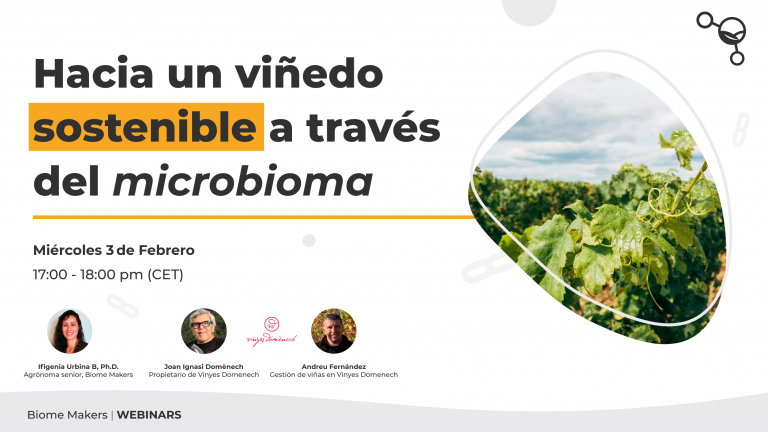Share this
How Soil Analysis Impacted Vineyard Management Practices
by Juan Vicente Beneitez Lajas on 20/May/22
The Vinyes Domènech winery has successfully improved the health and functionality of their soil based on the BeCrop Test, a microbial soil analysis. In this article, we will provide details of this success story.
In 2002, the Vinyes Domènech winery was founded in the southern part of the Catalan Priorat. The Domènech-Nogueroles family had a vision: their winemaking project would preserve and enhance the estate's heritage while respecting the protected unique ecosystem with one hundred hectares of forest on the property in which it was immersed. Although, the Vinyes Domènech faced a variety of problems:
- Presence of pathogenic fungi in the vine wood
- The appearance of Blackfoot and Petri's disease
- Lack of vigor in the oldest existing vineyards
- Compaction,
- Shallow soils with little organic matter
- A lack of nutrient assimilation by the plants - nutrients that were present, but blocked, in the soil.
In its constant search for more sustainable solutions and agricultural practices, Vinyes Domènech made the decision in 2017 to assess the soil in one of its four terraces, the 28th. To do so, they conducted a study with Biome Makers using the BeCrop Test, a microbial soil analysis that used the microbiome and its interactions, with key indicators: bio-sustainability, soil health, and nutrition. The objectives of this study included monitoring the health of the soil, identifying potential risks, measuring and improving the impact of inputs, and agricultural practices, and characterizing the biological terroir of the plot.
BeCrop Test confirmed a high concentration of pathogenic microorganisms which could generate disease risks, poor adaptability of the vines to stressful situations such as sudden changes or adverse weather, and low availability of soil nutrients for the plants in the plot.
Based on the comprehensive BeCrop analysis, a step-by-step guide was created to improve these conditions.
- Incorporate beneficial compost in the soil at optimum maturity, which finds a balance with the microbial life already present in the plot and which does not exceed 70 ºC in its fermentation process to guarantee the life of the microorganisms.
- Reinforce the budding vines with treatments against powdery mildew at the foliar level.
- Incorporate pruning wood into the soil, a farming practice that had been used up until that point and which, consequently, caused wood disease.
In 2020, after three years of improved agricultural practices based on soil functionality analyses, Vinyes Domènech decided to commission a second evaluation of plot 28 to measure its progress since the first analysis.
The 2017 and 2020 samplings results:
- Increase in the functionality of the microbiome, i.e. the beneficial functions that microorganisms perform in the soil. Beneficial species in the fight against pathogens increased, which decreased the risk of diseases and increased the health of the parcel. Blackleg, Petri's disease, and powdery mildew, among others, disappeared.
- An increase in the availability of nutrients for the plants: phosphorus and potassium, previously blocked due to lack of solubilization, as well as magnesium, significantly increased their mobilization.
- Increase in the presence of phytohormones and stress adapters.
- The plot transitioned from the release of carbon to sequester carbon in soil thanks to a better balance of metabolic pathways, making the vineyard a more sustainable space.
In conclusion, vine mortality is now much lower, micronutrient deficiencies have disappeared, and the soil is alive. The BeCrop Tests have been a key factor in guiding the changes made at the Vinyes Domènech winery. The new agricultural practices had a positive impact on the vineyard and helped them implement a sustainable, regenerative system in line with Vinyes Domènech's philosophy of maintaining the balance between the ecosystem and the crop. Proof of this came in the form of the "Qualified Estate Wine" recognition by Incavi and DO Montsant and the Vine-Grower Award by the same Designation of Origin conferred in 2019.
Share this
- March 2026 (1)
- June 2025 (2)
- September 2024 (1)
- August 2024 (1)
- July 2024 (1)
- June 2024 (2)
- May 2024 (2)
- April 2024 (2)
- March 2024 (1)
- February 2024 (1)
- January 2024 (1)
- November 2023 (1)
- October 2023 (1)
- September 2023 (1)
- August 2023 (2)
- July 2023 (2)
- May 2023 (2)
- April 2023 (3)
- March 2023 (3)
- February 2023 (2)
- January 2023 (1)
- November 2022 (1)
- October 2022 (2)
- September 2022 (1)
- August 2022 (3)
- July 2022 (3)
- June 2022 (1)
- May 2022 (5)
- April 2022 (7)
- August 2021 (1)
- July 2021 (1)
- May 2021 (1)
- April 2021 (4)
- November 2020 (3)
- October 2020 (4)
- September 2020 (1)
- August 2020 (3)
- July 2020 (1)
- June 2020 (1)
- May 2020 (2)

